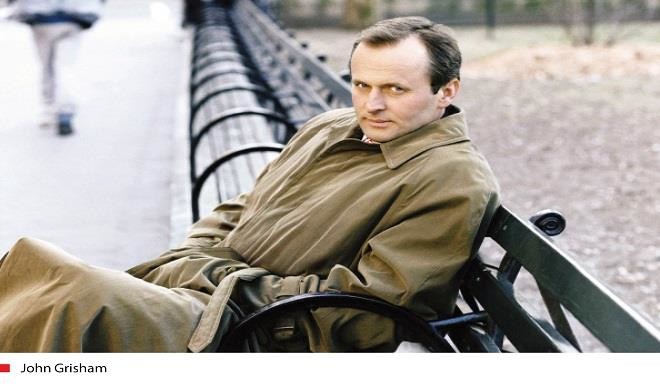Review: In John Grisham’s ‘The Whistler,’ a serious woman and serious crime
John Grisham has now written 29 legal thrillers and fought harder for truth, justice and the American way than anyone this side of Superman. His values don’t change, and neither do his tactics, but the Grisham formula hasn’t gotten old. Or older. When he’s on his game, as he is with his latest, “The Whistler,” […]


John Grisham has now written 29 legal thrillers and fought harder for truth, justice and the American way than anyone this side of Superman. His values don’t change, and neither do his tactics, but the Grisham formula hasn’t gotten old. Or older. When he’s on his game, as he is with his latest, “The Whistler,” it really works.
His novels for adults, as likely to appear in October as falling leaves, involve some form of injustice. They reveal things about the law that many readers probably don’t know. And they do not make it difficult to tell good from evil. Bad equals the death penalty. Good equals those of whom it can be said, “they were smart and unpretentious, didn’t make a lot of money but were dedicated to their work.”
“The Whistler” is a huge improvement on the book that preceded it, last October’s “Rogue Lawyer.” That one was so reminiscent of Michael Connelly’s “Lincoln Lawyer” that there was reason to fear that Mr. Grisham might be running out of inspiration. Maybe he just needed a break from his long string of male protagonists, because the main character in “The Whistler” is a seriously appealing woman: Lacy Stoltz, an investigator for the Florida Board on Judicial Conduct. Through a long string of amazing coincidences, this book winds up pitting Lacy against the Honorable Claudia McDover, “a Florida gal who just happens to be the most corrupt judge in the history of America.”
The issue of overseeing judicial ethics might be enough of a hook on its own. But Mr. Grisham involves all of this book’s characters with a tract of Native American land that has welcomed gambling and the way it exists outside Florida law. The small Tappacola tribe has welcomed a group of mobsters, known as the Coast Mafia, to indulge in unlimited development in tribal land (despoiling nature equals terrible) in exchange for a share of the casino’s profits. None of this would have been possible without the help of the aforementioned judge, who had been contentedly accepting monthly cash bribes at the start of Mr. Grisham’s story.
“The Whistler” refers to a whistle-blower who secretly calls attention to corruption. If the corruption involves the kinds of crimes being committed by the Coast Mafia (including skimming and laundering the casino’s cash and hiding money offshore), not to mention the judge’s transgressions, the whistle-blower may receive a cash reward. But we don’t know this person’s motives – throughout most of the book we don’t even know who he or she is. We just know that Lacy has been contacted by an intermediary: an ex-con who lives on a nice boat, uses a fake name, drinks beer to Jimmy Buffett music and turns up to play the informant now and then.
The book starts innocently enough, with the formerly married Lacy living alone and enjoying it while Hugo Hatch, her fellow investigator, struggles to make ends meet with a wife and four children. Their home base is Tallahassee. The casino development is also in the Florida Panhandle, though closer to Pensacola. The book’s ubervillain, a mob kingpin calling himself Vonn Dubose, has named one of his many golf communities there “Rabbit Run.” If this is a reference to John Updike, it’s a strange one.
Lacy and Hugo are close enough for Hugo’s stressed-out wife, Verna, sometimes to enlist Lacy as a babysitter. But the mundane disappears after Lacy and Hugo get a mysterious summons from a source. He would like to meet them in a remote spot near the Tappacola reservation late at night. For safety reasons, they should never have agreed to this. For the book’s purposes, it’s a major shot of adrenaline.
The stakes suddenly become much higher, and the suspense tightens after a relatively slow start. Lacy soon realizes what a dangerous situation she has gotten into – and like any Grisham hero, she is anything but cowed. She is more determined than ever to get to the heart of this realm of corruption, and the rest of the book digs deeper and deeper into an elaborate crime scheme. It is much worse than anything Lacy has ever imagined, let alone encountered.
Events and revelations are what keep Mr. Grisham’s books moving. It’s unlikely that anyone looks to him for sheer style. Without exactly being repetitious, he makes this story longer than it has to be; he’s terrific with short fiction, as his collection, “Ford County,” made so clear. And the dialogue can be generic, to put it mildly. As in: “It’s a complicated story and it only gets better”; “You seem to know more than you’re willing to tell”; and the classic “That’s not enough time,” followed by, “That’s all we have.”
Despite the bits of leaden language, Lacy does manage to come to life on the page. “The Whistler” also has a strong and frightening sense of place, painting part of the Panhandle as a lawless region where terrible things might happen, and do. And Mr. Grisham deserves credit for dependability: He is at heart an optimist who believes that wrongs can be ferreted out and righted. We could use a little of that these days.
Courtesy: The New York Times
